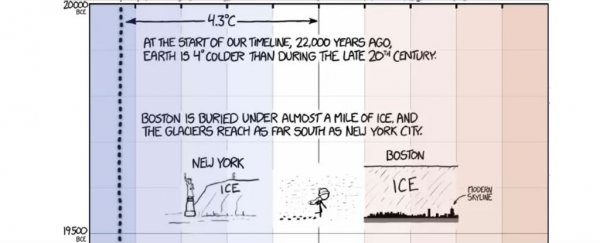One of the most commonly used arguments against human-caused climate change is that Earth has experienced severe fluctuations in temperature over its 4.5-billion-year lifespan, so it doesn't make sense to start freaking out about it now.
But while Boston was once covered in almost a mile (1.6 km) of ice, and the Arctic Circle was once so warm, palm trees and crocodiles populated it instead of ice and polar bears, what's been going on over the past century is unprecedented.
Not convinced? Just check out the infographic below by Randall Munroe of XKCD fame.
Illustrating the rise in global temperatures from 20000 BCE right up to 2016, nothing makes it more clear just how insane things have gotten during the fraction of Earth's timeline that humans have been dominating.
As you can see below, in 20000 BCE, Earth was at the peak of the last ice age, and was 4.3 degrees Celsius colder than it was in the late 20th century.
That might not sound like much, but it made a huge difference - glaciers reached as far south as New York City, and our early human ancestors had to fight for survival.
But slight changes in Earth's orbit at around 18500 BCE meant some of that polar ice could finally be reached by more sunlight, and the warming period began.
Ice sheets start melting in earnest across the North and South Poles, and humans start to spread out and proliferate in the more favourable conditions.
Between 9000 and 8500 BCE - just before we domesticated cows for the first time - temperatures hit modern levels, and continue to rise.
For thousands of years afterwards, things start wavering around that middle line, and we see a big cool-down around the 15th and 16th centuries.
The 20th century happens, and then… BAM. Things get real.
Something else to keep in mind is that, regardless of what's happened before, we humans are incredibly sensitive creatures.
We struggled to survive when global temperatures were 4.3 degrees colder than the late 20th century average, and we'll struggle just the same if we let Earth warm by just 1 or 2 degrees in the coming decades - something that 2015 Paris Climate Conference attempted to draw everyone's attention to.
As Brad Plumer points out over at Vox:
"What's most relevant to us humans, living in the present day, is that the climate has been remarkably stable for the past 12,000 years. That period encompasses all of human civilisation - from the pyramids to the Industrial Revolution to Facebook and beyond.
We've benefited greatly from that stability. It's allowed us to build farms and coastal cities and thrive without worrying about overly wild fluctuations in the climate."
Check out the awesome infographic below by XKCD, and use it whenever you hear someone make the "Earth's climate has been changing forever!" argument.
As Neil deGrasse Tyson once said, "The good thing about science is that it's true, whether or not you believe it." Earth's warming at unprecented levels whether we like it or not, and no one's going to fix it for our sake but us.

H/T Vox
